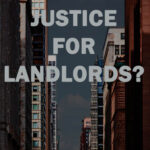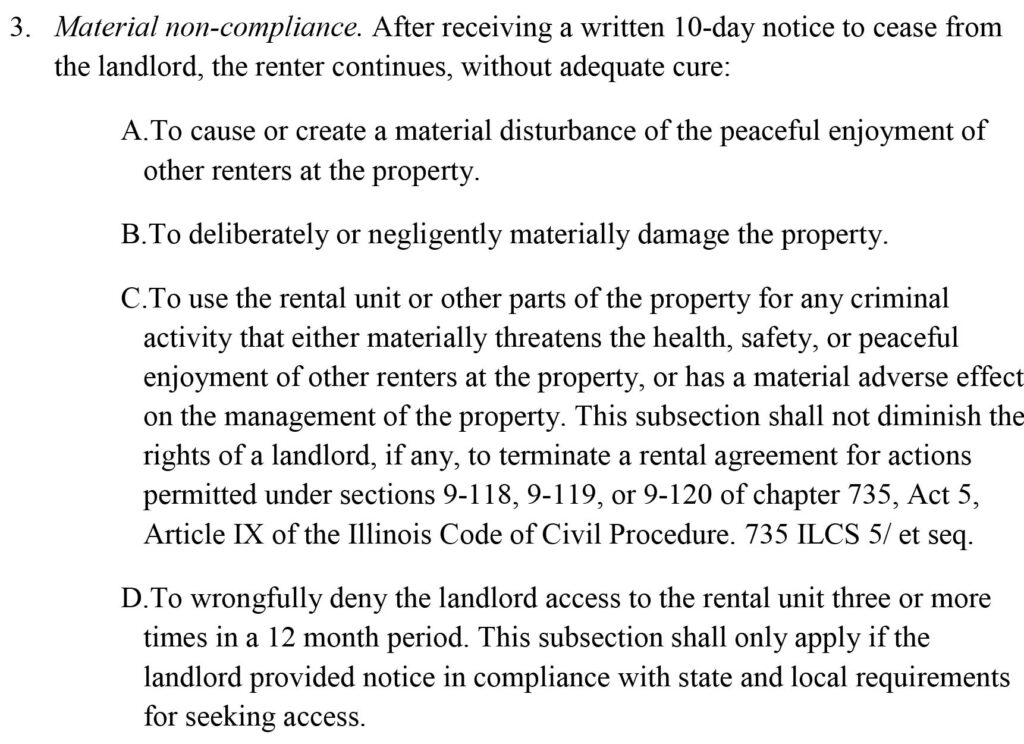 Here we are in the week that the so called “Good Cause for Eviction Ordinance” is expected to be presented to the Chicago City Council possibly to introduce the most sweeping anti-landlord change to landlord-tenant law in Chicago since 1986. So, remember where we left off. The not-yet-proposed draft of the ordinance indicates that no landlord shall recover possession of a rental unit by not renewing or bringing an eviction unless the landlord brings the eviction or initiates the non-renewal for one of eight reasons. We talked about the first two reasons in earlier bog posts. Let’s take a look at the third reason which is entitled “Material non-compliance”:
Here we are in the week that the so called “Good Cause for Eviction Ordinance” is expected to be presented to the Chicago City Council possibly to introduce the most sweeping anti-landlord change to landlord-tenant law in Chicago since 1986. So, remember where we left off. The not-yet-proposed draft of the ordinance indicates that no landlord shall recover possession of a rental unit by not renewing or bringing an eviction unless the landlord brings the eviction or initiates the non-renewal for one of eight reasons. We talked about the first two reasons in earlier bog posts. Let’s take a look at the third reason which is entitled “Material non-compliance”:
 So, this basis picks up on a concept already embodied in the Chicago Residential Landlord Tenant Ordinance at 5-12-130(b) – the ten day notice for material non-compliance with a lease. Chicago already has a twist on regular eviction jurisprudence. Normally, if a tenant breaches a lease, under Illinois law, that tenant is supposed to get a landlord’s 10 day notice in conformity with 735 ILCS 5/9-210. Chicago goes and gives a tenant a 10 day right to cure the violation. There is no right to cure under Illinois law. The Good Cause ordinance goes even farther.
So, this basis picks up on a concept already embodied in the Chicago Residential Landlord Tenant Ordinance at 5-12-130(b) – the ten day notice for material non-compliance with a lease. Chicago already has a twist on regular eviction jurisprudence. Normally, if a tenant breaches a lease, under Illinois law, that tenant is supposed to get a landlord’s 10 day notice in conformity with 735 ILCS 5/9-210. Chicago goes and gives a tenant a 10 day right to cure the violation. There is no right to cure under Illinois law. The Good Cause ordinance goes even farther.
Under the Good Cause ordinance, a tenant who gets a 10 day notice is still given a chance to cure. The reasons for eviction for material compliance are:
A. If the tenant causes or creates a material disturbance of other renters at the property. Let’s talk frankly for a minute about this one. Landlords tell me all the time about “that renter on the third floor” who creates trouble in the building by fighting with other tenants, being creepy, being difficult, or not following basic rules of society or observing normal manners. Almost everyone has lived next to this tenant at one time or another. This is the kind of tenant who clears out the good tenants in buildings. And what do most landlords do to that tenant? They let the lease expire, don’t renew it, and move on. This ordinance would not allow that. Advocates of the Good Cause ordinance might say that this section of the “protects” the landlord from just such a person. It does… if you think going to court and proving a “material disturbance” is fun, inexpensive, or easy. There are major proof problems in such a case and no guarantee of a win.
B. If the tenant deliberately or negligently materially damages the rental unit. There’s a lot of lawyer wiggle words in there. Deliberate or negligent damage and damage that is material. Again, lots of room for lawyers to fight over the validity of a termination.
C. If the tenant uses the rental unit for criminal activity that materially threatens the health, safety, or peaceful enjoyment of other renters at the property, or has a material adverse effect on the management of the property. More lawyer words. But basically, “for cause”. This doesn’t deviate much from current Chicago law.
D. If the tenant wrongfully denies the landlord access three or more times in a 12 month period provided the landlord had complied with applicable law in seeking access. This is kind of odd. So, a tenant can deny a landlord lawful access three times before a landlord can give them the heave-ho? That’s a lot of payments to the plumber for a trip out to the property to fix the sink when the tenant doesn’t agree to open the door.
Keep in mind that for any of these four reasons, the landlord bears the burden of proof, meaning that the landlord must “prove his case”.
Here’s what’s disturbing about this. Section 7 of the draft ordinance indicates that “if landlord acts in violation of or fails to comply with this chapter, the renter has a defense in an eviction action or any action brought against the renter to recover possession of the rental unit.” So, it is a violation for a landlord to comply. What does that mean? Does it mean that a landlord has a good faith belief that a tenant violated the lease or disturbed others or did damage to the property, gave a notice, and brought the case to court, and then fails to “prove” the case has VIOLATED the act? I hope not (although I fear that this is exactly what it means) and in such case, section 7b provides:
Section 7. Remedies; Defenses
(b) For each violation of this chapter, a renter shall be entitled to $21,200, together with reasonable attorney’s fees and costs.
So, if a landlord tries to evict the tenant but is unsuccessful, does the landlord owe the tenant $21,200 plus attorney’s fees? That’s what it looks like. Hey landlord, want to argue that the tenant is disturbing others in the building? Want to prove that they didn’t cure? Want to prove that the disturbance was material? Yikes. No one will get evicted if that’s the way it goes.
So again, call your Alderman. Call the Mayor. Let them know that you are against the Good Cause for Eviction Ordinance. It would be great if landlords, realtors, and property managers could stop this law before it is even introduced.
